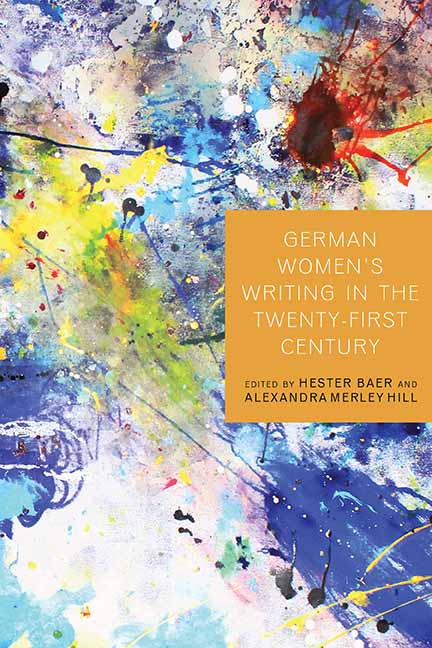Book contents
- Frontmatter
- Dedication
- Contents
- Acknowledgments
- Introduction: German Women’s Writing Beyond the Gender Binary
- 1 Language-Bodies: Interpellation and Gender Transition in Antje Rávic Strubel’s Kältere Schichten der Luft and Judith Hermann’s “Sonja”
- 2 Matrilineal Narrative and the Feminist Family Romance
- 3 The Pitfalls of Constructing a Female Genealogy: Cultural Memory of National Socialism in Recent Family Narratives
- 4 Reckoning with God: Attitudes toward Religion in German-Language Women’s Writing in the Twenty-First Century
- 5 Muslim Writing, Women’s Writing
- 6 Popfeminism, Ethnicity, and Race in Contemporary Germany: Hatice Akyün’s Popfeminist Autobiographic Works Einmal Hans mit scharfer Soße (2005) and Ali zum Dessert (2008)
- 7 The Awkward Politics of Popfeminist Literary Events: Helene Hegemann, Charlotte Roche, and Lady Bitch Ray
- 8 The Indictment of Neoliberalism and Communism in the Novels of Katharina Hacker, Nikola Richter, Judith Schalansky, and Julia Schoch
- 9 Sounds of Silence: Rape and Representation in Juli Zeh’s Bosnian Travelogue
- Bibliography
- Notes on the Contributors
- Index
Introduction: German Women’s Writing Beyond the Gender Binary
Published online by Cambridge University Press: 25 May 2021
- Frontmatter
- Dedication
- Contents
- Acknowledgments
- Introduction: German Women’s Writing Beyond the Gender Binary
- 1 Language-Bodies: Interpellation and Gender Transition in Antje Rávic Strubel’s Kältere Schichten der Luft and Judith Hermann’s “Sonja”
- 2 Matrilineal Narrative and the Feminist Family Romance
- 3 The Pitfalls of Constructing a Female Genealogy: Cultural Memory of National Socialism in Recent Family Narratives
- 4 Reckoning with God: Attitudes toward Religion in German-Language Women’s Writing in the Twenty-First Century
- 5 Muslim Writing, Women’s Writing
- 6 Popfeminism, Ethnicity, and Race in Contemporary Germany: Hatice Akyün’s Popfeminist Autobiographic Works Einmal Hans mit scharfer Soße (2005) and Ali zum Dessert (2008)
- 7 The Awkward Politics of Popfeminist Literary Events: Helene Hegemann, Charlotte Roche, and Lady Bitch Ray
- 8 The Indictment of Neoliberalism and Communism in the Novels of Katharina Hacker, Nikola Richter, Judith Schalansky, and Julia Schoch
- 9 Sounds of Silence: Rape and Representation in Juli Zeh’s Bosnian Travelogue
- Bibliography
- Notes on the Contributors
- Index
Summary
THIS BOOK INVESTIGATES the way women's writing and feminist literary criticism constitute key sites for imagining, critiquing, and troubling gender in the twenty-first century. We aim to instigate an invigorating discussion of German women's writing by emphasizing the intersectional qualities of both women's literature and feminist analysis today. Making the case for renewed attention to women's writing appears particularly crucial at the present moment, defined by neoliberal capitalism and proclamations of postfeminism, when the study of literature in general, and women's literature in particular, is waning. Yet as the contributions to this volume show, contemporary women's writing engages in important and nuanced ways with the seismic social, political, and economic transformations of the present, many of which affect women in particular. Moreover, women's literature provides imaginative possibilities—both for understanding the present and for envisioning change—that carry renewed significance in the twenty-first century.
In arguing for new attention to women's writing, we do not seek to revive an outdated concept, engage in a nostalgic excavation, or reassert essentialized, normative categories. In contrast to the twentieth century, when the literary canon largely excluded works by female authors, and feminist criticism emphasized projects of recovery and reevaluation, today women's literature is commonplace, mainstream, and widely accepted. At the same time, contemporary feminists have thoroughly problematized any unified conception of “woman” (as a category of political agency, or indeed of authorship) by emphasizing the constitutive role of difference in understanding both the construction of identity and the complexity of oppression. Trenchant critiques by poststructuralist and queer theorists emphasizing the fluidity, contingency, and performativity of gender and sexuality have underscored the normativity and instability of identity categories. Together, these developments have sometimes made gender seem either redundant or empty as a category of analysis, and at times they have appeared to stymie feminist theory and criticism.
As Toril Moi has argued, these developments also help to explain “why feminist theory stopped being concerned with women and writing” after the 1980s: how can one speak of women's literature if “woman” has been theoretically deconstructed?
- Type
- Chapter
- Information
- German Women's Writing in the Twenty-First Century , pp. 1 - 17Publisher: Boydell & BrewerPrint publication year: 2015



